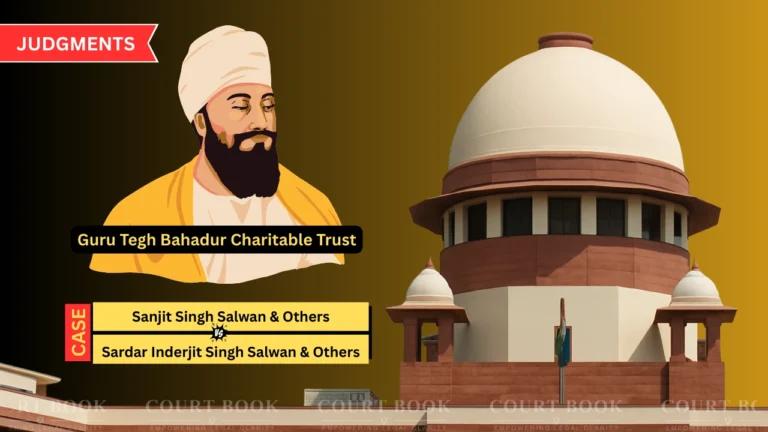The Supreme Court of India, in a significant ruling on 14 August 2025, allowed the appeal filed by Sanjit Singh Salwan & Ors. against Sardar Inderjit Singh Salwan & Ors., restoring the right to execute a consent decree based on an arbitral award in the long-standing dispute over the affairs of the Guru Tegh Bahadur Charitable Trust.
Background of the Dispute
Both appellants and respondents were trustees of the Trust. The respondents claimed the appellants had been removed and filed a civil suit for perpetual injunction to restrain them from entering and interfering with the Trust-run school.
Read also:- Delhi High Court Orders Protection for Inter-Faith Couple Facing Threats from Family
The trial court, on 13 April 2022, rejected the suit under Order VII Rule 11 CPC, holding it barred by Section 92 CPC. The respondents appealed but, during its pendency, both parties agreed to arbitration by Advocate Vipin Sodhi.
On 30 December 2022, the arbitrator passed an award detailing Trust management arrangements. Both sides jointly accepted it and filed a compromise deed before the District Court, which disposed of the appeal on 27 January 2023 in terms of the award.
"We both parties accept the Award and it shall be binding on us. We shall not challenge the award and will abide by it in true sense and spirit," the joint application stated.
Read also:- Madras High Court Frees Lawyers and Law Students Detained in Chennai Sanitary Workers' Protest Case
The decree was never challenged.
The appellants took steps to comply but alleged that the respondents failed to fulfill their obligations. Initially filing execution proceedings in November 2023, they later withdrew them and sought interim relief under Section 9 of the Arbitration and Conciliation Act, 1996.
The Commercial Court (May 2024) held the dispute non-arbitrable under Section 92 CPC, declaring the award a nullity. The High Court (August 2024) upheld this view.
The apex court found the respondents estopped by conduct from challenging the decree’s validity after having voluntarily accepted and benefited from the award.
Read also:- After 15 Years Apart, Supreme Court Grants Divorce and Orders ₹1.25 Crore Alimony to Wife and Son
Referring to the doctrine of approbate and reprobate, the Court said parties cannot accept a decision for convenience and later reject it for advantage.
It ruled that the lower courts failed to appreciate the legal impact of the compromise decree and respondents’ conduct.
The Supreme Court:
- Set aside the orders of the Commercial Court and High Court.
- Allowed revival of the execution proceedings (Misc. Case No. 122 of 2023).
- Directed that execution be decided on its merits in accordance with law.
“The appellants cannot be left remediless, especially when the compromise decree remains unchallenged,” the bench observed.
Case Title: Sanjit Singh Salwan & Others vs. Sardar Inderjit Singh Salwan & Others
Jurisdiction: Civil Appellate Jurisdiction
Case Type: Civil Appeal (arising out of SLP (Civil) No. 29398 of 2024)
Citation: 2025 INSC 988
Date of Judgment: 14 August 2025














